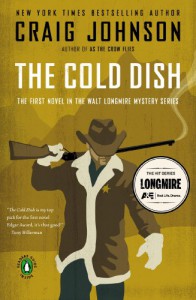

Some books just click into a slot in my imagination and light it up. "The Cold Dish" is one of them.
From the first chapter of "Cold Dish" I knew that all I wanted to do was settle down and listen to anything Sheriff Longmire had to tell me about anything at all.
Now some of that may be because the audiobook is narrated George Guidall in a voice that creates a sense of craggy solidity, tinged with slightly weary self-deprecation and a habit of humour that has been worn threadbare by continued use in the face of the otherwise unbearable.
Some of it is because Longmire is a man whose bright future is behind him. He's mourning his wife's death. His wife died three years earlier and, as seems to be the American way, he is being told that he needs to move on. I felt deep empathy with not just his inability to do this but his inability to conceive of why he should want to do this. If my wife died, I know that for me, three years of mourning would pass in a heartbeat and would not be close to being enough. I recognised the truth of what he said about surviving his wife:
"When they are gone, we are left with who we are after we were with them, and sometimes we don't recognize that person."
Walt has been around forever and is beginning to wonder why he's still here. He has a dry sense of humour and low expectations of other people and of life in general. What keeps him tethered to the world are a few long term friendships and an inability to let acts of evil slip by.
I was pleased to see that Walt is not the only strong character. Henry Standing Bear, Walt's oldest friend, ex-special forces, current owner of the Red Pony Bar and possible murder suspect is beautifully drawn. Then there's Deputy Vic Moretti, Walt's heir-apparent in his long-planned retirement. She's a hard-charging cop from Philidephilia, marooned in Wyoming after moving for her husband's job. She's tough and direct and takes no shit from anyone. She's also isolated, lonely and surviving mostly on the sheer determination not to give in.
The relationship between these characters is human and believable and far away from crime fiction cliché
Here's an example of a rate emotionally exchange, at a time of high tension, between Walt and Vic:
I put my arm around her shoulders and pulled her in. It was a risky move, but she didn't resist, and I rested my chin on the top of her head. "Thanks for coming up after me."
Her voice was muffled and sounded strained. "You're the only friend I've got."
"I bet you say that to all the sheriffs."
There's a case, of course. Maybe two cases really, neither of them pleasant. Young white boys doing despicable things to an even younger mentally impaired native girl, getting away with it and then, years later starting to turn up shot dead.
The case serves to show us the world from behind Walt Longmire's eyes and understand what he believes being a Sheriff is all about.
Craig Johnson's writing is excellent: unhurried, self-assured, nuanced and accessible.
Here's an example: Walt is in the Red Pony bar, sitting in the dark because the ancient fuse for the lights has blown, talking to Varney, a woman he has known, albeit slightly, all his life. Varney knew his wife, knows his daughter, Katy and has returned to Wyoming after living in New York. Seeing Walt's depressed mood Varney places her hand on Walt's and says:
"Walter, are you alright?"
It always started like this, a touch and a kind word, I used to feel heat behind my eyes and a shortness of breath but now I just feel the emptiness. The fuses of desire are blown black windows and I'm gone with no pennies to save me.
"Oh, you mean you really want to talk?"
Her eyes were so sad, so honest.
"Yeah, I figured seeing as how we didn't have anything else to do."
So I leaned in and told her the truth.
"I just... I'm just numb most of the time."
She blinked.
"Me too."
I felt like one of those guys in the movies, there in a foxhole asking how much ammo your buddy's got - I got two more clips. How about you?
"I know the things I'm supposed to do but I just don't seem to have the energy. I mean, I've been thinking about turning over my pillow for three weeks."
"I know."
She looked away.
"How's Katy?"
Here I was, on the white-capped Pacific of self-pity and Varney threw me a lifeline, to keep me from embarrassing myself.
I'm sure now that I'll be listening to George Guidall read every book in this series and, when I've done that, I'll take a look at the TV series based on the books.










